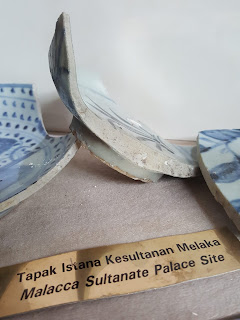Ceramic Wares on display in Melaka
Fukian was
one of the districts in South China, which was actively involved in the
ceramics industry during the 16 and 17 centuries.
However,
they are not connect to the ceramics produced by the Ming or Ching dynasties,
but were called for Swatow wares, named after the harbor from which they were
exported overseas to Malaysia, Indonesia, Philippines, Japan, India and
elsewhere.]
The
differences between the Swatow ceramics and the Ming and Ching porcelain ware can
be easily spotted.
The Swatow
wares are usually large and coarse, with sand particles or minute stones
attached to the glazed base.
They were
attractive but were roughly made, in colours such as red, greenish blue and
black.
There are
also other Swatow-made varieties such as
those coated with a dull blue colour or celadon glaze.
The Swatow
ceramics industry also produced wares with Islamic motifs and decorations as
well as Arabic script and Quran verses for markets in the Muslim countries.
The Swatow
industry was also affected by the political upheavals in China and eventually
lost its identity.
The ceramic
shards exhibited in the xxx are some of the samples of various types found in
Melaka either through excavations or diggings by various departments.
 |
| Ethnology & Heritage Museum |
 |
| Ethnology & Heritage Museum |
 |
| Ethnology & Heritage Museum |
 |
| Ethnology & Heritage Museum |

Comments